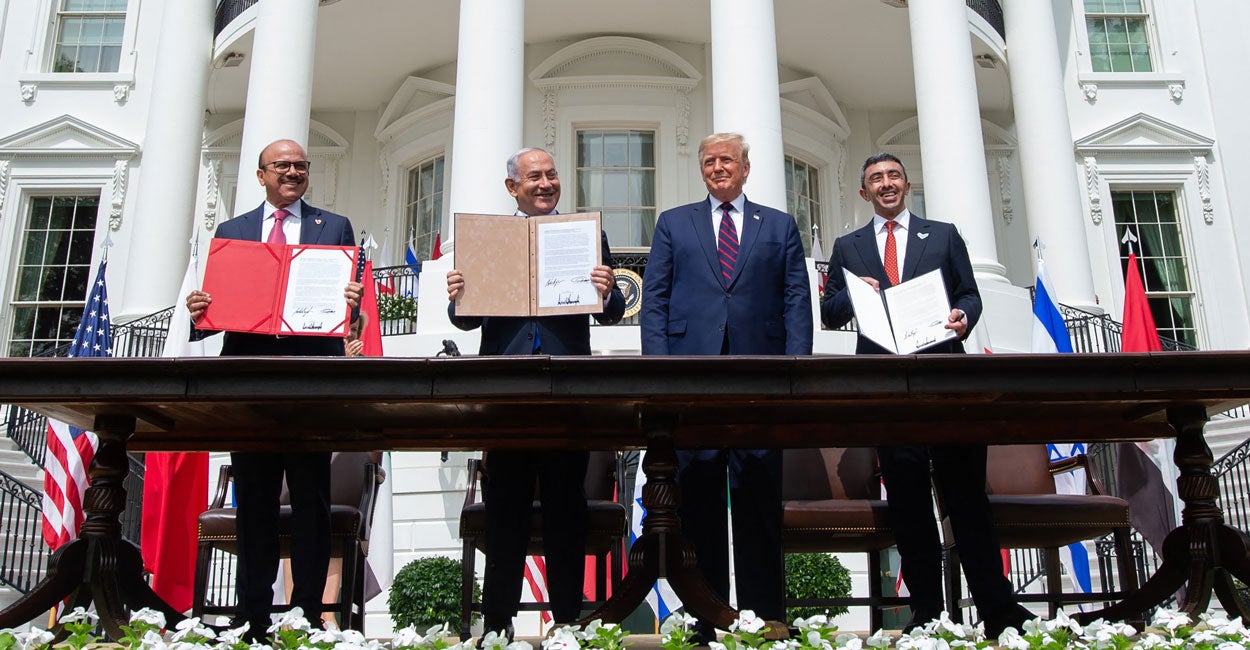


A number of Abraham Accords nations expressed concern in the wake of U.S. strikes on Iran’s Fordow, Natanz, and Isfahan nuclear sites over the weekend.
“The United Arab Emirates has expressed its profound concern over the continued tensions in the region and the targeting of Iranian nuclear facilities,” Afra Al Hameli, director of strategic communications for the UAE Ministry of Foreign Affairs, wrote on X Sunday.
“The UAE stressed the need for immediate de-escalation to avoid serious repercussions and spare the region from being pulled into deeper levels of instability,” Al Hameli added.
The UAE is one of four Abraham Accords nations, the others being Bahrain, Morocco, and Sudan. The Abraham Accords were formed under the first Trump administration and normalized relations between the four participating nations and Israel.
Following the U.S. attack on Iran’s nuclear sites, the kingdom of Bahrain called for “de-escalation” and urged “swift resumption of negotiations to restore peace.”
Trump urged Iran to reach a diplomatic solution with the U.S. to eliminate the threat of Iran’s nuclear program and set a 60-day deadline to reach a deal. No deal was reached by the deadline, at which time Israel launched targeted attacks on Iran’s nuclear sites, military facilities, and top leaders beginning on June 13.
“The countries of the Abraham Accords are well aware of the threat posed by the radical ayatollah regime to their own security and to regional stability,” Asher Fredman, director for Israel at the Abraham Accords Peace Institute, told The Daily Signal. The institute, which was established under the leadership of President Donald Trump’s son-in-law Jared Kushner, has since been absorbed into The Heritage Foundation.
Abraham Accords nations “have suffered in the past from direct attacks carried out by Iranian proxies, such as the Houthis,” Fredman said. “At the same time, they are concerned by the disruption which may be caused by an expansion of the war, including the potential targeting by Iran of their own energy facilities or of U.S. bases in their territories. They have therefore called for de-escalation and gone to lengths to show that they are not involved in the war.”
“At the end of the day, however,” Fredman continued, “I believe that the countries of the Abraham Accords would be happy to see the terror-exporting Iranian regime weakened or removed from power, to be replaced by a moderate government that contributes to regional stability and growth.”
Morocco’s Ministry of Foreign Affairs did not make a public statement regarding the U.S. attack on Iran’s nuclear sites over the weekend, but did condemn Iran’s attack on Qatar soil on Monday.
Iran fired 14 missiles at the U.S. military base in Qatar on Monday, according to Trump.
“Regarding the attack today at the American base in Qatar, I am pleased to report that, in addition to no Americans being killed or wounded, very importantly, there have also been no Qataris killed or wounded,” Trump wrote on Truth Social.
The UAE and Bahrain also released statements Monday expressing solidarity with Qatar and denouncing Iran’s attack.
Sudan, currently in the midst of a civil war, expressed “deep concern over recent developments in the region,” following the U.S. strikes on Iranian nuclear sites.
“The Ministry reiterates its statement issued on June 13, which affirmed its rejection of any violation of the sovereignty of the Islamic Republic of Iran,” the Ministry of Foreign Affairs of Sudan said in a statement on X.
“Iran poses a threat not just to Israel and the United States, but also to the Abraham Accords countries,” David Aaronson, a visiting fellow at The Heritage Foundation’s Allison Center for National Security, told The Daily Signal.
Iran “funds and arms the Houthis, which fire at the UAE and Bahrain,” Aaronson said. “It funds and arms the Polisario Front, which fires at Morocco. It funded and armed the Bashir regime in Sudan, which committed the genocide in Darfur.”
“The countries of the region are witnesses to the successful accomplishments of Israel and the United States during their recent military operations in Iran,” Aaronson said, adding that he thinks current events in the Middle East provide an opportunity for more nations to join the Abraham Accords.
